疑问代词的用法
疑问代词及其用法
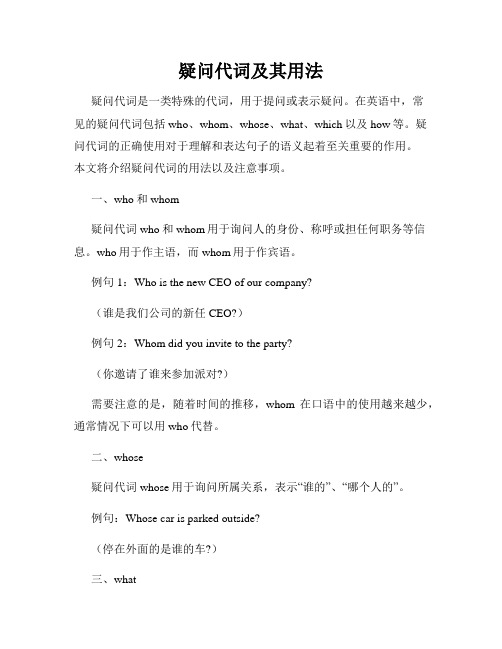
疑问代词及其用法疑问代词是一类特殊的代词,用于提问或表示疑问。
在英语中,常见的疑问代词包括who、whom、whose、what、which以及how等。
疑问代词的正确使用对于理解和表达句子的语义起着至关重要的作用。
本文将介绍疑问代词的用法以及注意事项。
一、who和whom疑问代词who和whom用于询问人的身份、称呼或担任何职务等信息。
who用于作主语,而whom用于作宾语。
例句1:Who is the new CEO of our company?(谁是我们公司的新任CEO?)例句2:Whom did you invite to the party?(你邀请了谁来参加派对?)需要注意的是,随着时间的推移,whom在口语中的使用越来越少,通常情况下可以用who代替。
二、whose疑问代词whose用于询问所属关系,表示“谁的”、“哪个人的”。
例句:Whose car is parked outside?(停在外面的是谁的车?)三、what疑问代词what用于询问事物的性质、类别、名称等,可以作主语、宾语或表语。
例句1:What is the answer to this question?(这个问题的答案是什么?)例句2:What do you want for dinner?(晚饭你想吃什么?)四、which疑问代词which用于选择或询问范围。
例句1:Which color do you prefer, red or blue?(你更喜欢哪种颜色,红色还是蓝色?)例句2:Which book did you borrow from the library?(你从图书馆借了哪本书?)五、how疑问代词how用于询问方式、手段、程度、数量等。
例句1:How did you get here so quickly?(你是如何这么快到达这里的?)例句2:How many cups of coffee did you drink this morning?(今早你喝了多少杯咖啡?)此外,how还可以与形容词和副词构成固定短语,表示程度或方式。
疑问代词的用法

疑问代词的用法疑问代词在句中起名词词组的作用,用来构成疑问句。
那么你知道疑问代词的用法吗?下面跟着店铺学习一下吧。
一、疑问代词的用法1、常用的疑问代词有:what, who, whose, whom, which, whatever, whichever ,whoever, whomever。
它们在句中可用作主语、表语、宾语、定语等。
2、疑问代词在句中应位于谓语动词之前,没有性和数的变化,除who之外也没有宾格的变化。
what, which, whose还可作限定词。
例句:Who is your English teacher? 你们的英语老师是谁?Whose is this umbrella? 这伞是谁的?Whose umbrella is this? 这是谁的伞?What question did he ask? 他问了什么问题?Which do you prefer, tea or coffee? 茶和咖啡,你喜欢那样?【说明】who 和 whom 只用作主语、宾语和表语,不用作定语,what, which, whose 则既可用作主语、宾语和表语,也可用作定语。
二、疑问代词的用法比较1. who 与 whom:前者为主格,用作主语,后者为宾格,用作宾格:Who spoke at the meeting? 谁在会上发言了?Whom are you talking about? 你们在谈论谁?但是,当用作宾语的 whom 位于句首时,通常可用who 代之:Who(m) is the letter from? 这信是谁寄来的?若是紧跟在介词之后用作宾语,则只能用 whom。
2. what, which 与 who:① 若后接名词(即用作限定词),只用which和what,不能用who:Which / What train did you come on? 你是坐哪次火车来的?What和which 的区别是:当选择的范围较小或比较明确时,多用 which;当选择的范围较较大或不明确时,多用 what:Which color do you like, red, black or white? 红色、黑色和白色,你喜欢哪种?What color is your car? 你的汽车是什么颜色的?但是,若指人,即使选择的范围不明确,也多用 which:Which [What] writers do you like? 你喜欢哪些作家?② 若其后不接名词(即用作代词),三者均可用,which和what的用法区别可参见上面的分析。
英语中疑问代词用法讲解
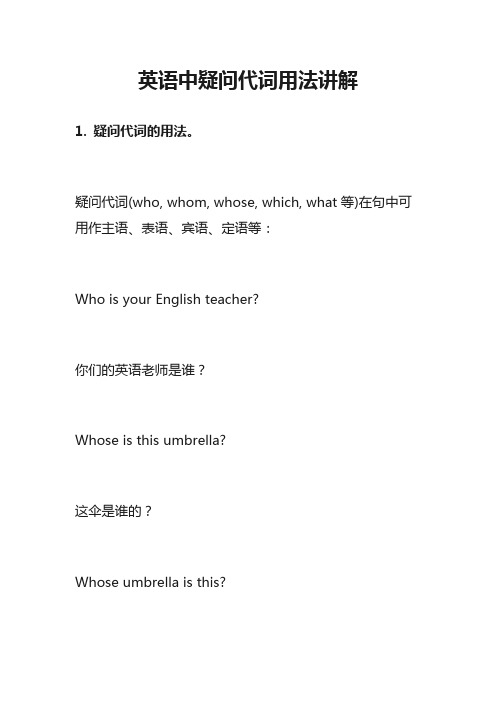
英语中疑问代词用法讲解1. 疑问代词的用法。
疑问代词(who, whom, whose, which, what等)在句中可用作主语、表语、宾语、定语等:Who is your English teacher?你们的英语老师是谁?Whose is this umbrella?这伞是谁的?Whose umbrella is this?这是谁的伞?What question did he ask?他问了什么问题?Which do you prefer, tea or coffee?茶和咖啡,你喜欢那样?注:who 和whom 只用作主语、宾语和表语,不用作定语,what, which, whose 则既可用作主语、宾语和表语,也可用作定语。
2. 两组疑问代词的用法比较(1)who 与whom:前者为主格,用作主语,后者为宾格,用作宾格:Who spoke at the meeting?谁在会上发言了?Whom are you talking about?你们在谈论谁?但是,当用作宾语的whom 位于句首时,通常可用who 代之:Who(m) is the letter from?这信是谁寄来的?若是紧跟在介词之后用作宾语,则只能用whom。
(2) what, which 与who:①若后接名词(即用作限定词),只用which和what,不能用who:Which / What train did you come on?你是坐哪次火车来的?What和which 的区别是:当选择的范围较小或比较明确时,多用which;当选择的范围较较大或不明确时,多用what:Which color do you like, red, black or white?红色、黑色和白色,你喜欢哪种?What color is your car?你的汽车是什么颜色的?但是,若指人,即使选择的范围不明确,也多用which:Which [What] writers do you like?你喜欢哪些作家?②若其后不接名词(即用作代词),三者均可用,which和what的用法区别可参见上面的分析。
疑问代词的用法

疑问代词的用法疑问代词是英语语法中的一个重要概念。
疑问代词用于提问或引导疑问句。
本文将详细介绍疑问代词的用法,包括主格疑问代词和宾格疑问代词。
1. 主格疑问代词主格疑问代词用于提问句子的主语。
常见的主格疑问代词有:who、what、which和whose。
1.1. WhoWho用于提问人的身份、职业、特征等。
例如:- Who is the new teacher?(谁是新来的老师?)- Who won the game?(谁赢得了比赛?)1.2. WhatWhat用于提问事物、情况、事件等。
例如:- What is your favorite color?(你最喜欢的颜色是什么?)- What happened at the meeting?(会议上发生了什么事情?)1.3. WhichWhich用于提问选择或区分。
例如:- Which book do you prefer, the red one or the blue one?(你更喜欢哪本书,红色的还是蓝色的?)- Which road should I take to get to the library?(我应该走哪条路才能到图书馆?)1.4. WhoseWhose用于提问所属关系。
例如:- Whose pen is this?(这是谁的钢笔?)- Whose car did you borrow?(你借了谁的车?)2. 宾格疑问代词宾格疑问代词用于提问句子的宾语。
常见的宾格疑问代词有:whom、what和which。
2.1. WhomWhom用于提问人做的动作的对象。
例如:- Whom did you invite to the party?(你邀请了谁参加派对?)- To whom should I give this letter?(我应该把这封信给谁?)2.2. WhatWhat用于提问事物或情况的内容。
例如:- What did you learn from the lecture?(你从讲座中学到了什么?)- What are you thinking about?(你在想些什么?)2.3. WhichWhich用于提问从多个选择中选择一个。
疑问代词什么的用法总结汉硕
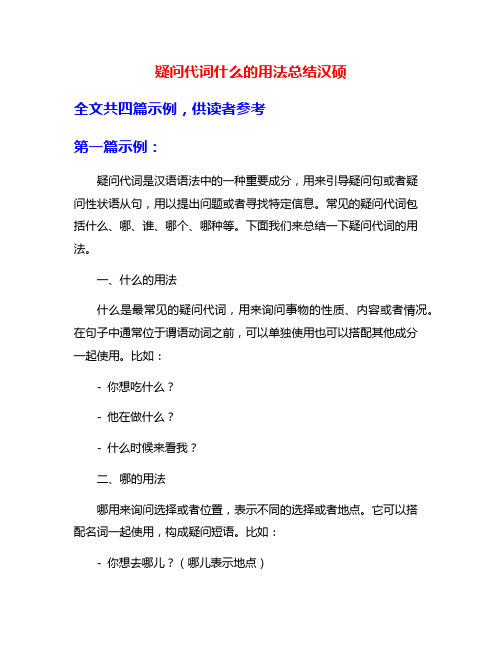
疑问代词什么的用法总结汉硕全文共四篇示例,供读者参考第一篇示例:疑问代词是汉语语法中的一种重要成分,用来引导疑问句或者疑问性状语从句,用以提出问题或者寻找特定信息。
常见的疑问代词包括什么、哪、谁、哪个、哪种等。
下面我们来总结一下疑问代词的用法。
一、什么的用法什么是最常见的疑问代词,用来询问事物的性质、内容或者情况。
在句子中通常位于谓语动词之前,可以单独使用也可以搭配其他成分一起使用。
比如:- 你想吃什么?- 他在做什么?- 什么时候来看我?二、哪的用法哪用来询问选择或者位置,表示不同的选择或者地点。
它可以搭配名词一起使用,构成疑问短语。
比如:- 你想去哪儿?(哪儿表示地点)- 哪个季节你最喜欢?(哪个表示选择)三、谁的用法谁用来询问人或者人物,表示对某个人的相关信息或者身份感兴趣。
比如:- 你知道谁是她的老师吗?- 谁来参加会议?四、哪个的用法哪个也是用来询问选择,但它更加具体和明确,通常指代具体的对象或者事物。
比如:- 你认识哪个学生?- 这两个方案中哪个更好?五、哪些的用法哪些和哪一个类似,用来询问选择,但它可以选择多个对象或者事物。
比如:- 你们想参与哪些活动?- 需要选择哪些材料来准备这个项目?疑问代词在汉语中扮演着非常重要的角色,能够帮助我们更准确地表达自己的疑问和需求。
掌握好疑问代词的用法,能够帮助我们更流利地进行交流,并且更加准确地获取想要的信息。
希望以上总结能够帮助大家更好地掌握疑问代词的用法。
第二篇示例:疑问代词是汉语语法中的重要成分,用来表示疑问的意义。
常见的疑问代词有:什么、谁、哪儿、哪个、几个等。
在句子中起到疑问的作用,有时也用来引导主语、宾语、状语等。
疑问代词的使用在汉语中有一定的规范和范围,下面就来总结一下疑问代词的用法。
一、什么1.1 用作状语什么可以作为状语,表示疑问的情况,例如:你在看什么?他问我什么事情?这里的“什么”作为状语,用来询问宾语。
1.2 用作谓语什么还可以作为谓语,表示疑问的情况,例如:发生了什么事情?你们在干什么?这里的“什么”用来询问事件、情况等。
疑问代词和疑问副词的用法

疑问代词和疑问副词的用法一、疑问代词的用法疑问代词用于提问,代替名词在句子中充当主语、宾语或定语,常见的疑问代词有谁(who)、什么(what)、哪一个(which)、哪些(which)、哪儿(where)、何时(when)、为什么(why)、如何(how)等。
1. 谁(who)谁用来询问人的身份、姓名或者指代一群人中的某个人。
例句:- 你知道谁赢得了比赛吗?- 谁是今晚的主持人?2. 什么(what)什么用来询问事物的性质、情况或者从多个选项中选择一个。
例句:- 你在看什么电影?- 明天的天气是什么样的?3. 哪一个(which)/哪些(which)哪一个/哪些用来在多个选项中进行选择。
例句:- 你喜欢哪一个颜色?- 请问哪些书是你推荐的?4. 哪儿(where)哪儿用来询问地点或位置。
例句:- 你知道他在哪儿吗?- 咖啡厅在哪儿?5. 何时(when)何时用来询问时间。
例句:- 你什么时候到达机场?- 下次见面是何时?6. 为什么(why)为什么用来询问原因或目的。
例句:- 你为什么选择这个大学?- 为什么他没有来参加会议?7. 如何(how)如何用来询问方式、方法或程度。
例句:- 你知道如何制作蛋糕吗?- 你觉得这个问题有多难解决?二、疑问副词的用法疑问副词一般用于疑问句中,用来询问具体的地点、时间、原因、方式等,常见的疑问副词有哪里(where)、何时(when)、为什么(why)、怎样(how)等。
1. 哪里(where)哪里用来询问地点。
例句:- 你去哪里度假了?- 我忘记把钱包放在哪里了。
2. 何时(when)何时用来询问时间。
例句:- 你何时买的这本书?- 下一次会议是何时?3. 为什么(why)为什么用来询问原因。
例句:- 为什么你选择这个职业?- 为什么他迟到了?4. 怎样(how)怎样用来询问方式、方法或状态。
例句:- 你知道怎样学习外语最有效吗?- 他不知道怎样解释这个概念。
疑问代词用法总结归纳

疑问代词用法总结归纳1. Who(谁)指代人,用于主语或宾语位置。
例如:"Who is that?"(那是谁?)"Whom did you see?"(你见了谁?)2. Whom(谁)用于强调或被动语态时的宾语。
例如:"To whom did you give the book?"(你把书给了谁?)3. What(什么)用于提问事物或情况。
例如:"What is your name?"(你叫什么名字?)"What happened?"(发生了什么事?)4. Which(哪一个)用于提问多个选项中的一个。
例如:"Which book do you want?"(你想要哪一本书?)5. Whose(谁的)用于询问所属关系。
例如:"Whose car is this?"(这是谁的车?)6. Whose(谁的)用于询问所属关系。
例如:"Whose car is this?"(这是谁的车?)7. Where(哪里)用于询问地点或位置。
例如:"Where is the nearest post office?"(最近的邮局在哪里?)8. When(什么时候)用于询问时间或时刻。
例如:"When is your birthday?"(你的生日是什么时候?)9. Why(为什么)用于询问原因或目的。
例如:"Why did you do that?"(你为什么这样做?)10. How(如何)用于询问方式或方法。
例如:"How do you cook pasta?"(你如何煮面条?)以上是疑问代词的常见用法总结的一些例子,但是需要根据具体语境灵活运用。
疑问代词用法
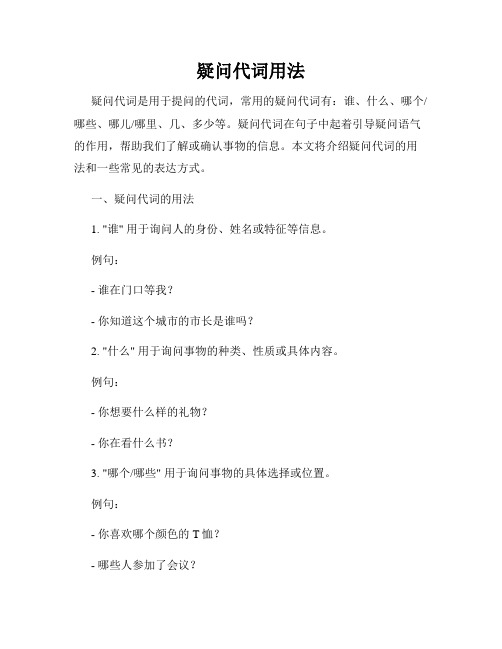
疑问代词用法疑问代词是用于提问的代词,常用的疑问代词有:谁、什么、哪个/哪些、哪儿/哪里、几、多少等。
疑问代词在句子中起着引导疑问语气的作用,帮助我们了解或确认事物的信息。
本文将介绍疑问代词的用法和一些常见的表达方式。
一、疑问代词的用法1. "谁" 用于询问人的身份、姓名或特征等信息。
例句:- 谁在门口等我?- 你知道这个城市的市长是谁吗?2. "什么" 用于询问事物的种类、性质或具体内容。
例句:- 你想要什么样的礼物?- 你在看什么书?3. "哪个/哪些" 用于询问事物的具体选择或位置。
例句:- 你喜欢哪个颜色的T恤?- 哪些人参加了会议?4. "哪儿/哪里" 用于询问地点或位置。
例句:- 你住在哪儿?- 哪里有好吃的餐厅?5. "几" 用于询问数量。
例句:- 你有几本书?- 你家有几口人?6. "多少" 用于询问数量或程度。
例句:- 你有多少钱?- 这本书多少钱?二、疑问代词的表达方式除了直接使用疑问代词提问外,我们还可以通过其他方式来表达疑问语气。
1. "是不是" 可以与疑问代词结合使用,表示一种肯定或否定的疑问。
例句:- 你是不是喜欢这个电影?- 这里是不是有好吃的饭店?2. "怎么样" 可以用在疑问代词之后,询问一种情况、状态或方式。
例句:- 这件事情怎么样?- 你觉得这个方案怎么样?3. "为什么" 用于询问原因或理由。
例句:- 为什么你不来参加聚会?- 你知道为什么公司决定取消这个项目吗?4. "多久" 可以用于询问时间的长短。
例句:- 你打算在这个城市待多久?- 这个会议要持续多久?总结:疑问代词是我们进行提问表达时常用的工具,通过合理运用疑问代词,我们可以更加准确地了解和获取所需的信息。
疑问代词用法详解

• 11). 问号码:What’s your telephone number? \ What number is the bus? • 12). 问地址:What’s your address? • 13). 问职业:What is your father? • 14). 问尺码:What size do you wear? • 15). 问人口:What’s the population in your country? • 16). 问年龄:What’s your age? • 17). 问意见:What’s your opinion? • 18). 问价格:What’s the price? • 19). 问天气:What’s the weather like in Beijing?
• • • • • • • • • •
Where is my computer? — It's behind the door. Where's Jim?吉姆在哪儿? -He's at home.他在家里。 Where're Lucy's books?露西的书在哪里? -They are in her bag.在她的书包里。 Where’s the mobile phone? —It’s on the desk. Where’re the shoes? —They’re under the bed.
1. what引导的各种特殊疑问句。
• • • • • • • • • • 01). 问运算:What's one plus two? 02). 问事物:What can you see in the picture? 03). 问时间:What's the time? \ What time is it? 04). 问颜色:What color is the car? 05). 问年级:What grade are you in? 06). 问班级:What class are you in? 07). 问评价:What do you think of this book? 08). 问座次:What row are you in? 09). 问星期:What day is it today? 10). 问日期:what’s the date today?
疑问代词和疑问副词初中语法详解

疑问代词和疑问副词初中语法详解疑问代词和疑问副词是初中语法学习的重要部分,它们在问句中起着引导疑问的作用。
在本文中,我们将详细了解疑问代词和疑问副词的用法和特点。
一、疑问代词的用法疑问代词用于直接提问一个人或物的身份、数量、位置、方式、原因等信息。
常见的疑问代词有:谁、什么、哪个、哪些等。
1. 谁(Who):用于询问人的身份、姓名等。
例句:Who is your best friend?(谁是你最好的朋友?)2. 什么(What):用于询问物体的种类、事情的性质等。
例句:What is this?(这是什么?)3. 哪个(Which):用于询问从多个选项中选择一个的情况。
例句:Which color do you like best, red or blue?(你更喜欢哪个颜色,红色还是蓝色?)4. 哪些(Which):用于询问从多个选项中选择多个的情况。
例句:Which books do you want to borrow?(你想借哪些书?)二、疑问副词的用法疑问副词用于直接提问一个人或物的地点、时间、方式、原因等详细信息。
常见的疑问副词有:在哪里、什么时候、怎么样、为什么等。
1. 在哪里(Where):用于询问地点。
例句:Where is the nearest supermarket?(最近的超市在哪里?)2. 什么时候(When):用于询问时间。
例句:When is your birthday?(你的生日是什么时候?)3. 怎么样(How):用于询问方式、状况等。
例句:How do you go to school?(你怎么上学?)4. 为什么(Why):用于询问原因。
例句:Why are you late for class?(你为什么迟到了?)三、疑问代词和疑问副词的特点疑问代词和疑问副词可以用于直接提问,也可以用于间接引导问句。
在直接提问时,它们通常被放在句首;在间接引导问句时,它们通常被放在动词或介词后面。
疑问代词的用法
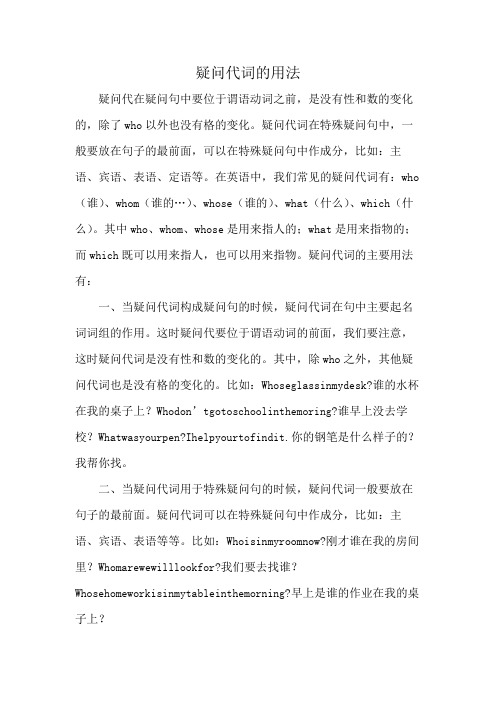
疑问代词的用法疑问代在疑问句中要位于谓语动词之前,是没有性和数的变化的,除了who以外也没有格的变化。
疑问代词在特殊疑问句中,一般要放在句子的最前面,可以在特殊疑问句中作成分,比如:主语、宾语、表语、定语等。
在英语中,我们常见的疑问代词有:who (谁)、whom(谁的…)、whose(谁的)、what(什么)、which(什么)。
其中who、whom、whose是用来指人的;what是用来指物的;而which既可以用来指人,也可以用来指物。
疑问代词的主要用法有:一、当疑问代词构成疑问句的时候,疑问代词在句中主要起名词词组的作用。
这时疑问代要位于谓语动词的前面,我们要注意,这时疑问代词是没有性和数的变化的。
其中,除who之外,其他疑问代词也是没有格的变化的。
比如:Whoseglassinmydesk?谁的水杯在我的桌子上?Whodon’tgotoschoolinthemoring?谁早上没去学校?Whatwasyourpen?Ihelpyourtofindit.你的钢笔是什么样子的?我帮你找。
二、当疑问代词用于特殊疑问句的时候,疑问代词一般要放在句子的最前面。
疑问代词可以在特殊疑问句中作成分,比如:主语、宾语、表语等等。
比如:Whoisinmyroomnow?刚才谁在我的房间里?Whomarewewilllookfor?我们要去找谁?Whosehomeworkisinmytableinthemorning?早上是谁的作业在我的桌子上?三、疑问代词还可以作限定词,这时我们要注意which与what 的区别。
which和what最大的区别就是所指的范围不同。
which是指在一定的范围内的东西;而what是可以指的无限的范围。
比如:Whichdogdoyoulovebestinthetreedogs?在这三个狗中,你最喜欢哪一个?Whatdogyoulikebest?你喜欢什么样的狗?Whichthebookdoyoulikebestinthetwobooks.在两本书中,你最喜欢哪一本?。
疑问代词基本用法
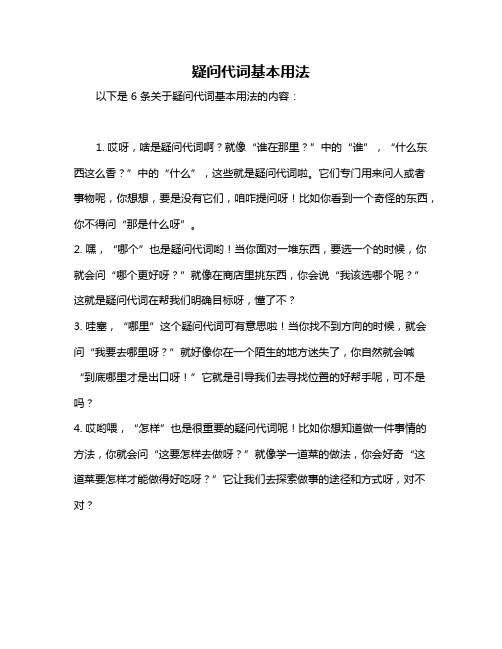
疑问代词基本用法
以下是 6 条关于疑问代词基本用法的内容:
1. 哎呀,啥是疑问代词啊?就像“谁在那里?”中的“谁”,“什么东西这么香?”中的“什么”,这些就是疑问代词啦。
它们专门用来问人或者事物呢,你想想,要是没有它们,咱咋提问呀!比如你看到一个奇怪的东西,你不得问“那是什么呀”。
2. 嘿,“哪个”也是疑问代词哟!当你面对一堆东西,要选一个的时候,你就会问“哪个更好呀?”就像在商店里挑东西,你会说“我该选哪个呢?”这就是疑问代词在帮我们明确目标呀,懂了不?
3. 哇塞,“哪里”这个疑问代词可有意思啦!当你找不到方向的时候,就会问“我要去哪里呀?”就好像你在一个陌生的地方迷失了,你自然就会喊“到底哪里才是出口呀!”它就是引导我们去寻找位置的好帮手呢,可不是吗?
4. 哎哟喂,“怎样”也是很重要的疑问代词呢!比如你想知道做一件事情的方法,你就会问“这要怎样去做呀?”就像学一道菜的做法,你会好奇“这道菜要怎样才能做得好吃呀?”它让我们去探索做事的途径和方式呀,对不对?
5. 嘿呀,“为什么”这疑问代词可太关键啦!当你对一件事情不理解的时候,你肯定会问“为什么会这样呀?”就像天空突然下雨了,你会疑惑“为什么好好的就下雨了呀?”它帮助我们寻求原因和解释呢,很神奇吧!
6. 哇哦,“几时”也算是疑问代词哟!当你和朋友约时间的时候,你就会问“我们几时见面呀?”就好比你有个重要的活动,你会想“活动几时开始呀?”这就是它在确定时间上发挥的作用呀!
我的观点结论就是:疑问代词真的超级重要,它们让我们的交流更加丰富和准确,学会运用它们,那可是大有用处呀!。
疑问代词什么的用法总结汉硕
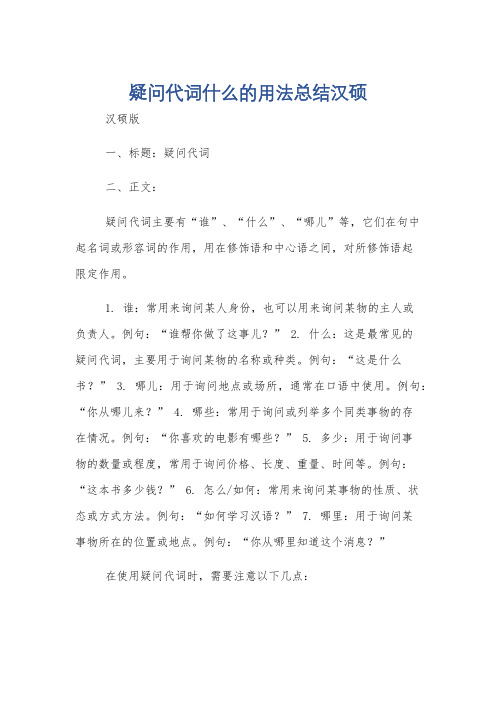
疑问代词什么的用法总结汉硕
汉硕版
一、标题:疑问代词
二、正文:
疑问代词主要有“谁”、“什么”、“哪儿”等,它们在句中起名词或形容词的作用,用在修饰语和中心语之间,对所修饰语起
限定作用。
1. 谁:常用来询问某人身份,也可以用来询问某物的主人或
负责人。
例句:“谁帮你做了这事儿?” 2. 什么:这是最常见的
疑问代词,主要用于询问某物的名称或种类。
例句:“这是什么书?” 3. 哪儿:用于询问地点或场所,通常在口语中使用。
例句:“你从哪儿来?” 4. 哪些:常用于询问或列举多个同类事物的存
在情况。
例句:“你喜欢的电影有哪些?” 5. 多少:用于询问事
物的数量或程度,常用于询问价格、长度、重量、时间等。
例句:“这本书多少钱?” 6. 怎么/如何:常用来询问某事物的性质、状
态或方式方法。
例句:“如何学习汉语?” 7. 哪里:用于询问某
事物所在的位置或地点。
例句:“你从哪里知道这个消息?”
在使用疑问代词时,需要注意以下几点:
1. 疑问代词通常位于句子的主语之后,修饰语之前。
2. 疑问代词可以充当主语、宾语、定语等句子成分。
3. 疑问代词可以单独使用,也可以与其他词语组合使用。
4. 疑问代词在口语中常用,但在正式场合或书面语中应慎用。
以上是汉硕版疑问代词的用法总结,希望能帮助到广大师生。
英语疑问代词的用法

英语疑问代词的用法疑问代词在句中起名词词组的作用,用来构成疑问句。
接下来,小编给大家准备了英语疑问代词的用法,欢迎大家参考与借鉴。
英语疑问代词的用法指人:who,whom,whose指物:what既可指人又可指物:which2)疑问代词在句中应位于谓语动词之前,没有性和数的变化,除who之外也没有格的变化。
what,which,whose还可作限定词。
试比较:疑问代词:Whose are these books on the desk?桌上的书是谁的?What was the directional flow of U. S. territorial1 expansion?美国的领土扩张是朝哪个方向的?限定词:Whose books are these on the desk?桌上的书是谁的?What events led to most of the east of the Mississippi River becoming part of the United States?哪些事件使密西西比河以东的大部分土地归属于美国?说明1:无论是做疑问代词还是限定词,which 和what 所指的范围不同。
what所指的范围是无限的,而which则指在一定的范围内,例如:Which girls do you like best?你喜欢哪几个姑娘?What girls do you like best?你喜欢什么样的姑娘?说明2:Whom是who的宾格,在书面语中,它作动词宾语或介词宾语,在口语中作宾语时,可用who代替,但在介词后只能用whom,例如:Who(m)did you meet on the street?你在街上遇到了谁?(作动词宾语)Who(m)are you taking the book to?你要把这书带给谁?(作介词宾语,置句首)To whom did you speak on the campus?你在校园里和谁讲话了?(作介词宾语,置介词后,不能用who取代。
初中疑问代词的用法及总结英语
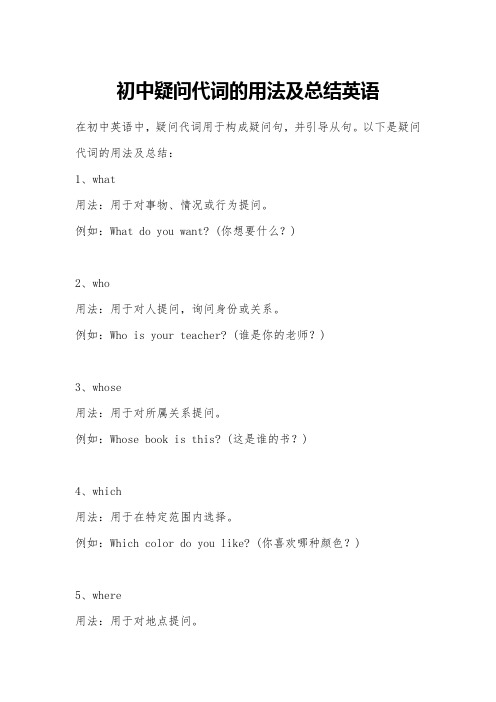
初中疑问代词的用法及总结英语
在初中英语中,疑问代词用于构成疑问句,并引导从句。
以下是疑问代词的用法及总结:
1、what
用法:用于对事物、情况或行为提问。
例如:What do you want? (你想要什么?)
2、who
用法:用于对人提问,询问身份或关系。
例如:Who is your teacher? (谁是你的老师?)
3、whose
用法:用于对所属关系提问。
例如:Whose book is this? (这是谁的书?)
4、which
用法:用于在特定范围内选择。
例如:Which color do you like? (你喜欢哪种颜色?)
5、where
用法:用于对地点提问。
例如:Where is the post office? (邮局在哪里?)
6、when
用法:用于对时间提问。
例如:When do you usually get up? (你通常什么时候起床?)
7、how
用法:用于对方式、程度、数量等提问。
例如:How many books do you have? (你有多少本书?)
8、why
用法:用于对原因提问。
例如:Why do you like English? (你为什么喜欢英语?)
以上就是初中英语中常见的疑问代词及其用法。
在实际使用中,可以根据语境选择合适的疑问代词来提问,引导出相应的回答。
汉语中疑问代词的用法讲解
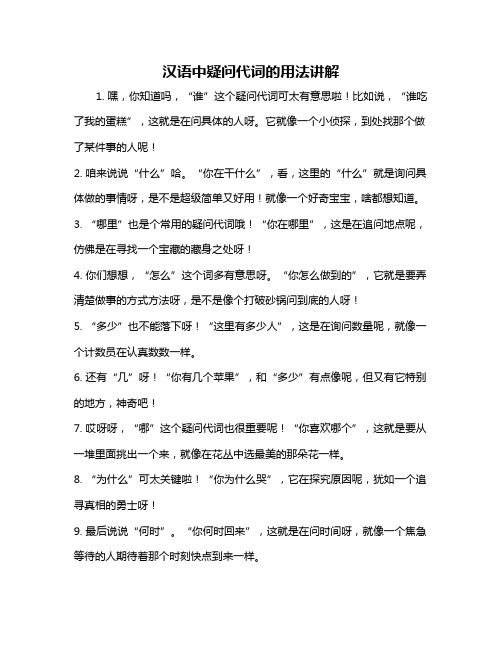
汉语中疑问代词的用法讲解
1. 嘿,你知道吗,“谁”这个疑问代词可太有意思啦!比如说,“谁吃了我的蛋糕”,这就是在问具体的人呀。
它就像一个小侦探,到处找那个做了某件事的人呢!
2. 咱来说说“什么”哈。
“你在干什么”,看,这里的“什么”就是询问具体做的事情呀,是不是超级简单又好用!就像一个好奇宝宝,啥都想知道。
3. “哪里”也是个常用的疑问代词哦!“你在哪里”,这是在追问地点呢,仿佛是在寻找一个宝藏的藏身之处呀!
4. 你们想想,“怎么”这个词多有意思呀。
“你怎么做到的”,它就是要弄清楚做事的方式方法呀,是不是像个打破砂锅问到底的人呀!
5. “多少”也不能落下呀!“这里有多少人”,这是在询问数量呢,就像一个计数员在认真数数一样。
6. 还有“几”呀!“你有几个苹果”,和“多少”有点像呢,但又有它特别的地方,神奇吧!
7. 哎呀呀,“哪”这个疑问代词也很重要呢!“你喜欢哪个”,这就是要从一堆里面挑出一个来,就像在花丛中选最美的那朵花一样。
8. “为什么”可太关键啦!“你为什么哭”,它在探究原因呢,犹如一个追寻真相的勇士呀!
9. 最后说说“何时”。
“你何时回来”,这就是在问时间呀,就像一个焦急等待的人期待着那个时刻快点到来一样。
总之,汉语中的这些疑问代词都超级有用的,它们就像我们表达中的小精灵,让我们能更准确、更生动地表达自己的想法和问题呀!。
基础英语之疑问代词用法
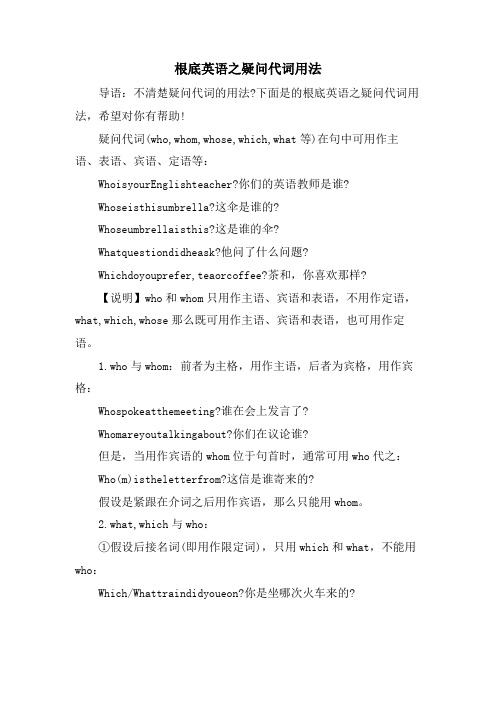
根底英语之疑问代词用法导语:不清楚疑问代词的用法?下面是的根底英语之疑问代词用法,希望对你有帮助!疑问代词(who,whom,whose,which,what等)在句中可用作主语、表语、宾语、定语等:WhoisyourEnglishteacher?你们的英语教师是谁?Whoseisthisumbrella?这伞是谁的?Whoseumbrellaisthis?这是谁的伞?Whatquestiondidheask?他问了什么问题?Whichdoyouprefer,teaorcoffee?茶和,你喜欢那样?【说明】who和whom只用作主语、宾语和表语,不用作定语,what,which,whose那么既可用作主语、宾语和表语,也可用作定语。
1.who与whom:前者为主格,用作主语,后者为宾格,用作宾格:Whospokeatthemeeting?谁在会上发言了?Whomareyoutalkingabout?你们在议论谁?但是,当用作宾语的whom位于句首时,通常可用who代之:Who(m)istheletterfrom?这信是谁寄来的?假设是紧跟在介词之后用作宾语,那么只能用whom。
2.what,which与who:①假设后接名词(即用作限定词),只用which和what,不能用who:Which/Whattraindidyoueon?你是坐哪次火车来的?What和which的区别是:中选择的范围较小或比拟明确时,多用which;中选择的范围较较大或不明确时,多用what:Whichcolordoyoulike,red,blackorwhite?红色、黑色和白色,你喜欢哪种?Whatcolorisyourcar?你的汽车是什么颜色的?但是,假设指人,即使选择的范围不明确,也多用which:Which[What]writersdoyoulike?你喜欢哪些作家?②假设其后不接名词(即用作代词),三者均可用,which和what的用法区别可参见上面的分析。
- 1、下载文档前请自行甄别文档内容的完整性,平台不提供额外的编辑、内容补充、找答案等附加服务。
- 2、"仅部分预览"的文档,不可在线预览部分如存在完整性等问题,可反馈申请退款(可完整预览的文档不适用该条件!)。
- 3、如文档侵犯您的权益,请联系客服反馈,我们会尽快为您处理(人工客服工作时间:9:00-18:30)。
英语代词用法详解·人称代词1. 主格与宾语人称代词有主格和宾格两种形式,第三人称的人称代词还有性别的变化。
主格主要用来做句子的主语,在正式文体中也可用作表语;宾格主要用作宾语,在口语中也常用来做句子的表语。
如下表:【说明】在口语中,若省略谓语及其他成分的短句中,人称代词宾格可用作主语。
如:“He has read the novel. ”“Me too. ”“他看过这小说”。
“我也看过”。
2. 人称代词的排列顺序两个或两个以上的人称代词并列使用时,对于单数人称代词,按“二三一”的顺序排列;对于复数人称代词,按“一二三”的顺序排列。
如:You, he and I must obey the rules. 你,他和我都得遵守规则。
We, you and they should stay here. 我们,你们和他们都应该留在这。
注意:(from )(1)若要承担责任或过失时,则通常将第一人称放在前面。
如:It was I and Tom who were late. 迟到的是我和汤姆。
(2)表示男女的代词并排使用时,通常是先男后女。
如:Nobody likes such things except him and her. 除了他和她,没有喜欢那样的东西。
3. 使用人称代词的几个注意点(1)指代国家、城市、地球、船舶、(雌性)动物等时,一般用代词it,但也可用she / h er(带感情色彩)。
如:My car’s not fast, but she does 50 miles to the gallon. 我的车不快,但每加仑油它能跑50英里。
(2)当上文提到的人的性别不明时,一般用he / him 来指代。
如:Whoever told you that, he was lying. 无论谁对你那样说,他都在说谎。
If a person had so much money, he would do it in another way. 要是一个人有那么多钱,他就会用另外一种方法做这事。
【说明】对于anybody, everybody, nobody, anyone, someone, everyone, no one 这类性别不明的不定代词,它们可用单数he, him 指代,也可用复数they, them指代,用单数较正式,用复数较口语化。
如:(from )If anybody [anyone] comes, ask him [them] to wait. 要是有人来,让他等着。
(3)代词we, you, they 有时可用于泛指一般人。
如:We [You] ought to obey the law. 大家都应遵守法律。
2. 人称代词的用法1)人称代词的主格在句子中只能够作主语。
如:She is the best student in her class. 她在她的班级里是最好的学生。
2)人称代词的宾格在句子中作动词、介词的宾语或表语。
如:Please give that book to me, Ben! 请把那本书给我,本!3)人称代词的语序几个人称代词并列作主语时,它们的顺序是:单数形式(你,他 / 她,我),即:you, he / she and I复数形式(我们,你们,它 / 他 / 她们),即:we, you and they3. 对人称代词进行提问时,通常使用who或whom, 有时也使用what (对it进行提问时)。
但要注意,whom是who的宾格形式,也就是说,只有被提问的人称代词在句子中作宾语或表语时, 才可以使用whom来提问,否则不可以。
但通常情况下who可以代替whom 来使用。
如:Who often helps you with your English? Whom do you like best?I. 根据句意用适当的人称代词填空。
1. —_________ am a teacher. What about your bother?—Oh, _________ is a policeman.2. —What is _________?—It is a new purse. I will give _________ to my mother.3. —Look, what a beautiful girl she is!—Yes. I want to give _________ some flowers. But where can I buy ________ _?II. 对划线部分提问。
1. The manager led them personally to their room._________ _________ them personally to their room?2. The dog showed the way to the blind man._________ _________ the dog show the way to?(参考答案:I. 1. I; he 2. it; it 3. her; them II. 1. Who led 2. Who / Whom did)There be 结构是一常见的表示“存在”的句型,但是,该结构不表示“存在”意义的现象又广见于书面语及口语,它以否定句的形式出现,用于对某一具体行为和抽象概念的否定。
其惯用结构一般有以下三种:一、There is + no + Noun + in doing something1.其中名词为表“利弊”、“用途”的抽象名词,如:There is no good in going. 去没有什么好处。
There is no harm in doing that. 那样做并无害处。
There is no use in doing it. 干此事毫无用处。
2.其中名词为表“价值”、“意义”的抽象名词,如:There is no sense in waiting here. 在这里等候下去毫无意义。
There is no point in doing so. 这样做毫无意义。
There is no disgrace in failing once. 一旦失败也不丢脸。
(注:此结构中的介词可以省略,如:There is no use asking her—she doesn’t know anything.)二、There is + no + doing something1.其中的动词(do)多为“转述”或“认知”等意义的动词,如:tell, say, know等,其后一般跟疑问句,如when,what等。
There is no saying what may happen. 很难说会发生什么事。
There is no telling when he will return. 说不清他何时回来。
There is no knowing when we shall meet again. 不知何时我们能再相会。
2.其他动词,其意义相当灵活。
There is no mistaking what ought to be done. 应该做什么是清楚的。
There is no denying the fact. 事实无可否认。
There is no holding back the wheel of history. 历史的车轮不能倒转。
There is no getting along with him. 他很难相处。
Once she starts talking, there is no stopping her. 一旦她打开话匣子,就说个没完。
There is no joking with him. 和他不能开玩笑。
三、There is + no + Action Noun此结构的含义相当于It’s impossibl e /unnecessary to do something。
如:There is no hurry about it. 没有必要这么急匆匆的。
There is no question of his honesty. 他的诚实是勿庸置疑的。
有时,在此结构中的Action Noun被动名词形式所取代,其意义不变。
试比较:There is no escape from the evident.There is no escaping the fact.两句都表示:无法逃(躲)避……但是,有时也存在意义上的区别,试比较:a. There is no doubt at all about it.b. There is no doubting her virtue.句a为“存在句”,意即:对于此事不存在任何的疑问。
句b则是不表“存在”的一种惯用结构,意即:她的贞操勿庸置疑。
以上三种结构除用于陈述句外,尚可见于疑问句。
如:Is there any use in discussing the matter further? 这种事再讨论下去有何益处?Is there any hurry about it? 这事需要匆忙吗?此惯用结构中的be有时可与情态动词连用,其语气更趋委婉。
如:There could be no mistaking where he had come from. 他从哪里来是相当清楚的。
此结构中的no也不是一成不变的,它可被其他形式所取代。
如:There isn’t any getting away from it. 要从它那里逃脱是不可能的。
There was never believing half of what he said. 他的话连一半也不信。
There’s never any predicting what they will do next. 无法料及他们下一步将会干什么。
